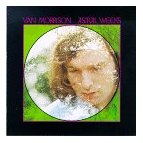Music |
Astral Weeks (Take Two)
Van Morrison
By
Published: Jan 01, 2005
Category:
Rock
I was at a conference. The opening night dinner. Bill Gates and Steve Jobs were seated, together, a few tables away. I was sitting with an old friend and Jimmy Guterman, known to me only as a magazine editor who had recently asked me to write for him. A topic eluded me. On this night, it eluded him as well.
I like to think the more-or-less expected conversations about careers and achievements and magazine assignments eluded us because, at bottom, we’re just not totally obsessed with careers and achievements and assignments. In any event, something happened — we started talking about Head Butler, And music. And beauty. And thus, inevitably, about “Astral Weeks.”
“Astral Weeks” comes up a lot when I talk about Butler — it’s the poster child for this site. Why? Not just because it’s sublime, a once-in-a-lifetime triumph even for Van Morrison, who has spent a lifetime turning out great CDs. But because it’s overlooked. Oh, insiders know about it. It’s on lots of “ten best” lists. But if you ask civilians about “Astral Weeks,” you generally get a blank. People know “Moondance.” And “Brown Eyed Girl. And, maybe, “Wild Nights.” They never get deep enough in the Morrison catalogue — or close enough to the insiders — to have heard “Astral Weeks.”
So it’s one of the missions of this site to push “Astral Weeks.” (If I could, I’d just buy CDs for all of you, that’s how much I want you to have it.) Because it’s got it all: beauty, strangeness, challenge, poetry, mystery, spirituality, excitement and, when it’s all said and done, a kind of transcendence and peace.
Anyway. Jimmy and I had a conversation about “Astral Weeks” and music, and he told me about his new Springsteen book, Runaway American Dream, and, the next morning, I found his appreciation of “Astral Weeks” in my e-mail box.
The thing is, there already was an appreciation of “Astral Weeks” on Head Butler. Mine. [ Click to read it.] But, hey — this is the poster child for the site. And who says you can’t praise the same thing twice? So thank you, Jimmy, for the fresh take on an old favorite. Maybe it will make believers of those of you who haven’t, for whatever reason, believed me…..
Astral Weeks
Van Morrison
The mystery of love, the love of mystery. Throughout Van Morrison’s career, the two notions circle each other and coalesce, swirling, until Morrison steps back, restarting the process. The title of one of Morrison’s most enduring songs, “Into the Mystic,” articulates this journey. (“Into the Mystic” is on “Moondance ,” a brilliant album except for its phenomenally overrated supper-club title track).
“Astral Weeks” is Morrison’s first real solo album after leaving Them and cutting some random sessions for Bang that yielded a Top Ten hit in “Brown Eyed Girl.” It’s drastically different from anything Van the Man had tried in the past or would attempt in the future. In terms of sustained intensity, only “St. Dominic’s Preview,” “Veedon Fleece” and “Into the Music” come close to “Astral Weeks ,” although all of Morrison’s albums offer some tracks worth hearing.
On “Astral Weeks ,” Morrison and his band — a hastily assembled jazz combo featuring the masterful melodic bassist Richard Davis — hunt for a place beyond words, a peaceful home safe from the tyranny of language. It doesn’t exist, of course. But “Astral Weeks” glides away from jazz into its own world. I must acknowledge that my knowledge of post-1930 jazz only slightly exceeds my fluency in Sanskrit, but anyone with ears knows that most fusions of jazz and rock incorporate the worst elements of both musical forms; the results are usually formless, over-orchestrated, and too loud.
“Astral Weeks” is perhaps the only overt jazz-rock mix that works, in part because its sparse settings are ideal counterpoints to the lyrics. Whatever the connection to jazz, “Astral Weeks” still aspires to pop. Pop music is inherently repetitive, and Morrison extends this idea to his words, and then to extremes. The lyrical repetitions on “Astral Weeks” surpass even those of James Brown, as Van expresses his roundabout visions with quiet intensity: “You breathe in you breathe out you breathe in you breathe out you breathe in you breathe out you breathe in you breathe out” and “You turn around you turn around you turn around you turn around” from “Beside You,” a diffuse tune about some of the redemptive powers of sex, are but two of the many examples. Morrison stretches the tunes, flexes the ideas, until they give him something he senses as new.
When Van does get around to relating stories, he can’t. The details are too sketchy. His narrators are too close to their material to step back and comment on their actions; they are imprisoned by their desires. “Cyprus Avenue” is “Lolita” as narrated by an unreflecting Humbert Humbert watching the girls walk by from his car seat, too paralyzed to move; “Madame George,” which takes place on the same street, observes a party (down to the “click and clack of the high-heeled shoes”) and identifies intensely with a ridiculed transvestite before Van cries, “That’s when you fall/that’s when you fall/when you fall into a trance” and the action returns to Van’s most favored landscape, his own mind, where he resolves to move on as strings carry him away.
This is an insular record, though apparently not by choice. No wonder the wily John Lee Hooker cut duets with him. Hooker didn’t get out of the blues alive; neither will Morrison.
— by Jimmy Guterman, Guest Butler
To buy “Astral Weeks” from Amazon.com, click here.


